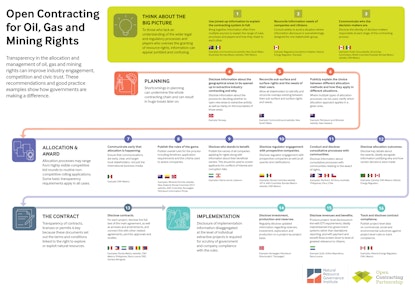Delving into the world of oil, mining and gas contracts with open contracting
These contracts impact the well-being of 3.5 billion people from 81 countries across the globe.
Deals in the oil, gas, and mining sectors are worth billions of dollars over decades but they often do not translate into human development and economic opportunity for citizens. Worse, there is abundant evidence that human development goes backward.
Oil and mining contracts used to be state secrets in many countries, and their publication was absolutely forbidden. There was no systematic guidance for ensuring transparency in allocating and managing the rights to explore and exploit natural resources.
But things have changed. The last 10 years have seen a global effort to shine a light on how extractive industries operate, through multi-stakeholder initiatives such as Publish What You Pay (PWYP) and the Extractive Industries Transparency Initiative (EITI) – we’re part of both. Together we follow the money from resource extraction into government budgets and public spending.
Key developments
- Over the past few years, we have seen a new norm at the global level as extractives contracts, licenses and permits are now published by over 40 countries around the world, and 27 countries have laws allowing or requiring the disclosure of extractives contracts.
- A number of progressive companies, 18 and counting, also support publishing their contracts as they know it builds trust and makes it less likely that those contracts will be renegotiated.
- In a major development, the EITI will require all its members to publish their oil and mining contracts by 2021.
The focus of this work is now moving to look at how the deals get done in the first place and how the money gets spent. Open contracting is central to both.
Open Contracting for Oil, Gas and Mining Rights
Our global analysis with the Natural Resource Governance Institute (NRGI) found 16 recommended better practices covering each stage of the contracting process, from planning to award of contracts to improving them and monitoring their implementation. We illustrated these principles with over 30 real-world examples from Australia, Canada, Chile, Ghana, Lebanon, Mexico, New Zealand, and Norway. We’ve also distilled these findings into a handy poster that should be of use to those involved in allocating extractive sector rights or influencing related policies.
Projects and partners
We are working with the EITI, NRGI and PWYP to make the information useful and accessible and to make sure it feeds back in better deals in the future.


